In Quebec “drinking sometimes is not an option” : Is there any good in Andrew Potter’s snowstorm malaise?
Mar 28th, 2017 | By L. Frank Bunting | Category: Canadian Provinces [UPDATED APRIL 3 – DORIS DAY’S BIRTHDAY]. Someone has sent this issue to me for comment. I’m not quite sure why. I have never lived in Quebec myself. (I am, for better or worse, a born and raised Torontonian.)
[UPDATED APRIL 3 – DORIS DAY’S BIRTHDAY]. Someone has sent this issue to me for comment. I’m not quite sure why. I have never lived in Quebec myself. (I am, for better or worse, a born and raised Torontonian.)
I do have a son who spent four years at McGill University in Montreal. And my late and increasingly lamented mother-in-law was born and raised in (as best I can figure) L̩vis and then Drummondville, in la belle province. She came to Ontario in her early 20s speaking almost no English. (And the big difference she noticed right away was that in Ontario politics was not as crucial as it was Рand no doubt still is Рin Quebec.)
My early years were also marked by two legendary trips to Quebec (in my own mind at any rate, of course). The first took place in the early 1960s when I was still in my (later) teens. One summer I hitch-hiked through Quebec with two friends, on the way to camping out by Percé Rock “in the Gulf of Saint Lawrence on the tip of the Gaspé Peninsula.” I still remember giant letters “FLQ” (for Front de libération du Québec), painted on the majestic rock walls that mark some stretches of the St. Lawrence River. And I could go on almost forever about this trip.
My second legendary trip was in the early 1970s, in my later 20s. It involved a larger group of men and women traveling via automobiles in winter. We stopped at someone’s remarkable aunt’s house in NDG (Notre-Dame-de-Grâce) in Montreal, and later visited Brother André’s remarkable St. Joseph’s Oratory. Then we had breakfast in Trois-Rivières, and finally landed in Quebec City for Carnaval de Québec. We stayed one night in rented rooms in a house in the suburbs, and then one night in an 18th century building downtown. In between we staggered around in the snow with hollow plastic canes full of alcoholic beverages, and met interesting people in the dark.
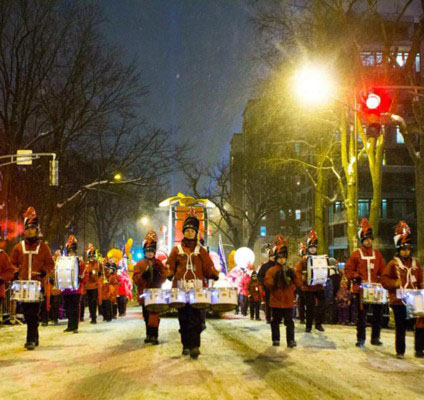
Carnaval de Qu̩bec comprend des d̩fil̩s de nuit Рce qui peut sembler particuli̬rement bizarre si vous avez bu (ou vous ̻tes ivre!).
Again I could go on. I grew up at a time when Quebec in Question was much in the Canadian political air – even outside Quebec (and perhaps especially in Southern Ontario). But already I have too much background here.
The issue I am supposed to be commenting on is succinctly sketched in Benjamin Shingler’s CBC News website piece, “Andrew Potter resigns McGill post after Maclean’s essay on Quebec … calling Quebec ‘pathologically alienated’ and ‘low-trust’ provoked political fury.”
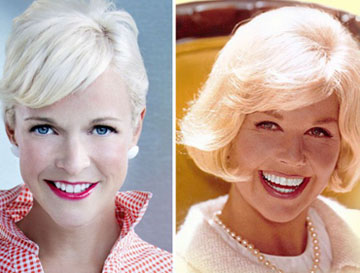 UPDATE APRIL 3, 2017 : Today is apparently Doris Day’s 95th birthday. (Congrats Doris, whose singing was much admired by the late great Canadian-born jazz critic Gene Lees.) Intriguingly she may also have (well, theoretically at any rate) some special connections with la belle province in Canada. Some two years ago La Presse in Montreal reported : “Les rumeurs veulent que l’actrice américaine Doris Day soit venue au Québec plusieurs fois à la recherche de sa petite-fille. Nous l’avons trouvée: Brigitte Boisjoli … La chanteuse québécoise a autant de pétulance que sa mamie virtuelle. Que sera sera!”
UPDATE APRIL 3, 2017 : Today is apparently Doris Day’s 95th birthday. (Congrats Doris, whose singing was much admired by the late great Canadian-born jazz critic Gene Lees.) Intriguingly she may also have (well, theoretically at any rate) some special connections with la belle province in Canada. Some two years ago La Presse in Montreal reported : “Les rumeurs veulent que l’actrice américaine Doris Day soit venue au Québec plusieurs fois à la recherche de sa petite-fille. Nous l’avons trouvée: Brigitte Boisjoli … La chanteuse québécoise a autant de pétulance que sa mamie virtuelle. Que sera sera!”
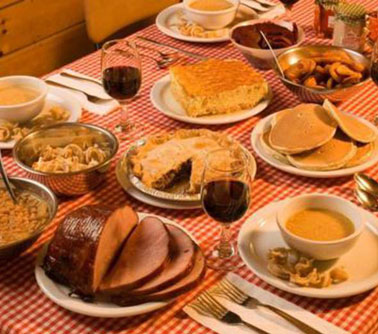
Traditional Canadien (ne?) cuisine you can still enjoy at Cabane à sucre "Chez Dany," 195 Rue de la Sablière in Trois Rivières.
My first point is just that I agree with the broad assessment offered by Barry Wilson at CTV in Montreal : “Potter was, until this week, the director of McGill University’s Centre for Canadian Studies. Potter’s crime was to write a rather odd and questionable column published by Maclean’s. Potter linked the [recent] Highway 13 snowstorm fiasco to a breakdown in Quebec society. Being stranded on the highway was caused by incompetence and bad communication not a ‘malaise eating away at Quebec society.’ Potter was way off base.”
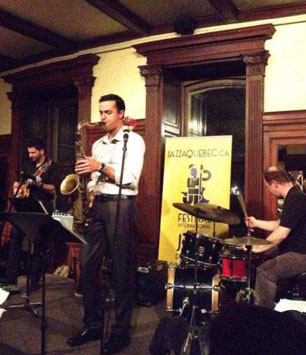
The Brazilian-born saxophonist Thiago Ferte, in his mid-30s, now resides (and gigs) in Quebec City, studies at Laval University, appears at the Montreal International Jazz Festival, and works on his second CD.
At the same time, for me there was something about Andrew Potter’s piece that somehow briefly reawakened the fascination with Quebec and its unique situation in Canada (and North America) which marked the 1960s, when I was coming of age myself.
I am quite certain this has nothing to do with the argument for a “malaise eating away at Quebec society” today that Mr. Potter makes. To take just one of many possible all-too-academic cases in point, Rodney Haddow’s book of 2015, Comparing Quebec and Ontario : Political Economy and Public Policy at the Turn of the Millenium, certainly does a better job of deploying statistics to describe Quebec in early 21st century Canada – and its “distinctive” (and, on some views, more progressive) “model” of social and economic development.
At the same time again, it may or may not be an accident that I have been reading about Andrew Potter’s controversial Maclean’s article on Quebec while also reading  R.W. Johnson’s review of R.T. Howard’s Power and Glory: France’s Secret Wars with Britain and America, 1945-2016, in  the London Review of Books.
It is at least possible that what Andrew Potter is trying to get at in Quebec today is part of some broader francophone cultural questioning that haunts the historic metropolis in France as well.
It does strike me that something of what both R.W. Johnson and R.T.Howard bring to bear on  francophone-anglophone relations most broadly conceived qualifies for the “negative portrait … based on prejudices” critique that Quebec premier Philippe Couillard leveled against Mr. Potter’s article in Maclean’s.  But Johnson also seems to appreciate that there is a broader anglophone cultural questioning in the air in 2017 as well. Note, eg, the very last sentences in his review of Howard’s book : “Everywhere, French power, culture and language are in retreat, and despite the rise of China, the expansion of Anglo-Saxon language, culture and soft power goes on. Currently, that means the triumph of Farage and Trump, of Sky TV, Fox News and the Daily Mail website. Many Anglo-Saxons are not happy about that.”
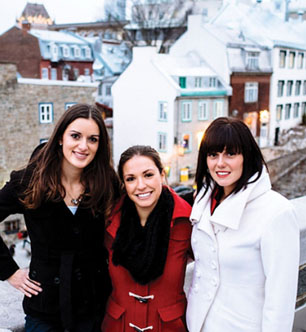
L-r : Marie-Pier Casgrain-Michaud, Valérie Vachon et Sarah Richard figurent parmi les 14 finalistes de la Reine du Carnaval de Québec en 2013.
The faint positive vibrations I finally seem to have taken from Andrew Potter’s article on  the ‘pathologically alienated’ Quebec of our time, however, flow from different bends in the river.
English-language journalism in Canada today, that is to say, pays considerably less attention to the Quebec that is “not a province like the others” than it did when I was growing up in the 1960s and 1970s. This is understandable, given the two sovereignty referendums of 1980 and 1995 and the continuing subsequent campaigns of the Parti Québécois (and the Bloc Québécois in Ottawa as well). For quite a few years I was not too interested in hearing more about Quebec myself.
Yet something about the Andrew Potter issue seems to me, in my wilder moments in any case, to signal some potential benign sea change in the broader Canadian political discourse (as they say in political science classes these days). Just this past Sunday, eg, two Globe and Mail articles offered examples : “McGill principal defends necessity of Andrew Potter’s resignation,” by education reporter Simona Chiose ; and “Paris on the Saint-Laurent: The French invasion of Montreal,” by Konrad Yakabuski (“who voluntarily exiled himself from Montreal for a few years” only to “return in 2015”).
One thing I have learned over what is now some considerable number of years watching, voting in, and sometimes otherwise vainly trying to vaguely influence Canadian politics is that Canada is certainly impossible without Quebec. And this is partly because, say whatever else you like, Quebec is considerably more interesting than every other part of the country. And, not to put too fine a point on it (and of course at its best), more fun.
Or, as Barry Wilson at CTV in Montreal has also explained : “sometimes in this province, drinking sometimes is not an option.” Â The rest of us in the English-speaking Canadian majority elsewhere may never quite learn to speak French even improperly (even as such things are judged along the banks of the St. Lawrence River). But the more we know about our fellow citizens in Quebec the better Canadians we will be ourselves. And maybe Andrew Potter has (quite accidentally of course) finally done something to at least start to bring us back to the good sides of where we were say, in 1968, when Justin Trudeau’s father first became prime minister of Canada.
 (And what I remember as I think back to then, is that I only really began to respect Pierre Trudeau after the Constitution Act, 1982. I nonetheless still have in my office an empty quart bottle with a Dow Ale label – to remind me of my trip to Percé Rock, in what I have just calculated was probably  the summer of 1963.)
(And what I remember as I think back to then, is that I only really began to respect Pierre Trudeau after the Constitution Act, 1982. I nonetheless still have in my office an empty quart bottle with a Dow Ale label – to remind me of my trip to Percé Rock, in what I have just calculated was probably  the summer of 1963.)



